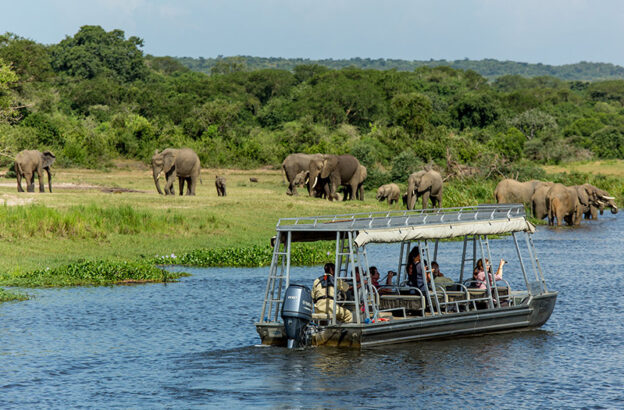Negative Effects of the Tourism Industry in Uganda
The following are the side effects of the tourism activities in the areas they are carried out or Uganda as a whole;
- Large pieces of land have been set aside for wild life conservation in terms of game parks, sanctuaries and game reserves which is an obstacle or a hindrance to other land uses. For example, the Murchison falls, Sippi and Bujjagali falls, would provide hydroelectricity than conserving them for tourism. Vast areas of land gazetted for game parks like Murchison falls National Park would encourage extensive crop cultivation and pastoralism, mountain Elgon forest national park led to the displacement of people, etc.
- Wild animals in national parks and other tourist centres are a danger to human lives and people’s property especially those living the tourist centres with forests. Animals destroy crops, eat the domestic animals as well as feasting on people. For example in 2005, the crocodiles in lake Victoria feasted on approximately 80 human beings in Bugiri and Mayuge districts on the shores of lake Victoria, elephants from Kibale forest destroy crop farms in Kibale district, etc.
- Some national parks and game reserves are densely populated with animals which are destructive to the environment. A large number of hippos in Lake Edward – George region and gazelles in L. Mburo N.P have led to over grazing thus severe soil erosion in the area. Trees are cut down to construct temporary accommodation structures and fuel wood for camp fire at night has forest depletion hence environmental degradation.
- Wildlife conservation areas such as Queen Elizabeth, Bunya forest reserve, Murchison falls national park are breeding areas for pests like tsetse flies, mosquitoes, ticks, Marburg virus, Bird flue, etc have threatened and scared the population around tourist centres which would have been labour force as the above pests cause diseases to them and their animals e.g. Nagana, sleeping sickness, Malaria, etc.
- Since Uganda’s tourist industry is driven and being invested in by foreign investors, much of the profits earned from the tourists are being repatriated to their mother countries leaving Uganda drained and undeveloped. For example Madhvani group of companies who invested in Mweya safari lodge have profit repatriated to Asia.
- Tourism industry is seasonal, unpredictable and very delicate industry, so it is unwise for Uganda to depend on it much because it may disappear almost overnight as a result of political instability, disease outbreak, natural disaster and economic depression in the economy. For example the killing of tourists in Bwindi national park in 1990’s, the constant outbreak of cholera in Kampala, Ebola in Gulu and presence of Aids in Uganda is a threat and has reduced the number of tourists. This has caused gross loses by the government and people who invest in the industry.
- Ugandan tourists are much foreign who come only during certain seasons when it is winter in their countries especially in Europe and North America. This increases the cost of operation of the tourist facilities in the months when the tourists are not in Uganda such as hotels are underutilized and this leads to high costs of operation of hotels like Africana in Kampala, Palm resort beach hotel in Entebbe, etc.
- The industry has led to an increase of prices of certain commodities and services where tourist attractions are found like arts and crafts, food stuffs, crafts, drinks and other attractive goods are sold expensively. For example food stuffs in Entebbe areas, arts and crafts at Buganda road in Kampala and Hotel accommodation facilities like in Sheraton and Grand imperial hotel are at high prices.
- The tourism growth in Uganda is coupled with the promotion of bad behaviors from different tourists with different life styles, so the Ugandan traditional values, culture and ways of living are likely to die out. For example, it has brought in the undesirable western ways of living like prostitution, clothing, religion, drug addiction, commercial Child sex, homosexuality and smoking in small towns like Kabalagala, Kayabwe along Masaka road and Nakasero in Kampala.
- Tourism in Uganda has encouraged the smuggling out of some rare wild life species world wide e.g. it is reported that through Entebbe international Airport, gorrilas, Chimps, Monkeys and beautiful birds like parrots from south Busoga forests, Bwindi forests and Malabigambo forest are smuggled. This threatens sustenance of the industry ecological balance.
- Tourism put pressure on all local resources such as energy, water and food. For example mushrooming hotels to support tourism like Serena, Sheraton, Golf course, Speke resort hotel have led to inadequate HEP supply leading to load shedding.
- It has also led to environmental pollution e.g. mountain climbers usually abandon polythene bags and oxygen containers on Mount Rwenzori and Elgon, different hotels release kitchen gases and wastes, etc.
- Some wrong elements pretend as tourists and cause damage in the country. Some of them are spies or even thieves who may cause danger to National security. Terrorism in Kampala in 1990,s such as bombs in Bars was suspected to be an act of some tourists.
- Some tourists are suspected to spread diseases to wildlife. For example the death of hippos in large numbers in Lake Edward – George – Kazinga channel complex in 2001 was suspected to be a human disease from tourists.

